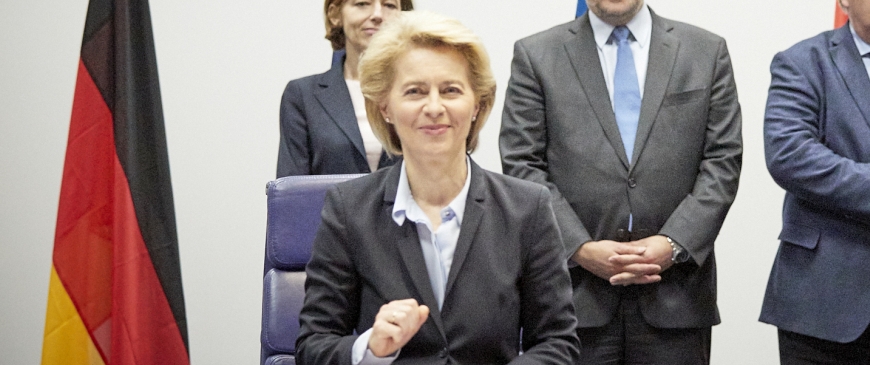
Ursula von der Leyen isn't perfect, but she's better than the alternative
On Tuesday evening, members of the European Parliament, the only directly elected institution in the European Union, will decide whether Ursula von der Leyen, Germany’s defense minister, should become president of the European Commission. Europe’s national leaders nominated von der Leyen on July 2, but she still needs to win an absolute majority in the European Parliament—which will require 374 votes from the current total of 747 members. And those votes are not a given.
Von der Leyen can probably rely on the support of the center-right European People’s Party (EPP), which holds 182 seats. But this is not enough to secure the presidency. She needs the support of the center-left Progressive Alliance of Socialists and Democrats (154 seats) and the centrist Renew Europe bloc (108 seats) or alternatively the European Greens (74 seats). Her current dilemma is largely the result of her boss’s approach to nominating her.
In paving the way for von der Leyen’s presidency, a Christian Democrat, German Chancellor Angela Merkel ignored the views of her coalition partner, the center-left Social Democratic Party (SPD), which had supported the candidacy of the Dutch politician Frans Timmermans. In response, SPD MEPs have tried to convince colleagues in the European Parliament to shoot down von der Leyen’s candidacy. The European Greens have already announced that they will vote against von der Leyen because she has failed to impress them with her stance on climate protection and her approach to democracy promotion. Although it is likely that the centrists will endorse von der Leyen, it is less clear how the European social democrats (S&D) will vote; some individual MEPs might be tempted to oppose her in the secret ballot.
Von der Leyen is by no means a perfect candidate. She has not held any EU post, and her professional life has oscillated mainly between the state government in Lower Saxony and the federal government in Berlin, where she has served in Merkel’s governments—first holding the family and labor portfolios and now as defense minister. Her critics worry that her stance on issues such as eurozone reform might be too heavily influenced by German preferences rather than what is good for the EU.
Some MEPs also fear that endorsing von der Leyen will be seen as a slap in the face to European voters. The European Parliament developed a so-called Spitzenkandidat (“lead candidate”) process in 2014, whereby each of the main political groupings in the European Parliament put forward a candidate for the commission presidency. The assumption was that the candidate of the group that won the largest number of seats would be nominated by EU leaders to become commission president.
The process was an effort to bring greater transparency to a system that had previously relied on backroom deals and to give voters more reason to take part in the parliamentary elections. Two lead candidates, the center-right Manfred Weber and the center-left Timmermans, campaigned across Europe in 2019, but EU leaders failed to agree to put either of them to the European Parliament for approval. Weber was widely seen as too weak, having never held an executive office; Timmermans, who has clashed repeatedly with the leaders of Hungary and Poland over their violations of the rule of law, was seen as too strong.
Timmermans’s candidacy was unacceptable to a number of Central European governments and to Italy—due to his uncompromising approach toward illiberal leaders—but reports suggest that the opposition of some EPP national leaders was the final nail in his coffin. The EPP leaders insisted that their political family, which won the biggest number of seats in the European elections, should have a first shot in trying to secure a majority in the European Parliament. As a result, the EU’s national leaders eventually pulled a rabbit out of a hat and proposed von der Leyen as their compromise candidate.
Fears that the leaders’ decision undermines the EU’s democratic legitimacy are exaggerated. The most recent survey suggests that only 8 percent of voters went to the polls in the European elections with a view to influencing the choice of commission president. And, ahead of the European elections, only 26 percent of Germans knew who the EPP Spitzenkandidat was—despite the fact that he was their compatriot: Weber.
Von der Leyen’s candidacy is in fact a product of parliament members’ own failure to rally behind one of their lead candidates, rather than an attempt by the EU’s national leaders to undermine the voters’ democratic choice. In 2014, Jean-Claude Juncker, the lead candidate of the center-right, got the job because the EPP and S&D immediately backed him and left national leaders with little choice but to nominate him.
The process of nominating the commission president is more cumbersome this time around because the center-right and center-left together no longer enjoy a majority in the European Parliament. But if MEPs from each of the political groups had believed that the preservation of the lead candidate system was vital to the EU’s democratic legitimacy, they could have joined forces to present national leaders with a single candidate with clear parliamentary support. They failed to do so, leaving the initiative to French President Emmanuel Macron, who was reportedly the key engineer of the von der Leyen compromise.
Agata Gostyńska-Jakubowska is a senior research fellow at the Brussels office of the Centre for European Reform. She is on Twitter @AgataGostynska.
